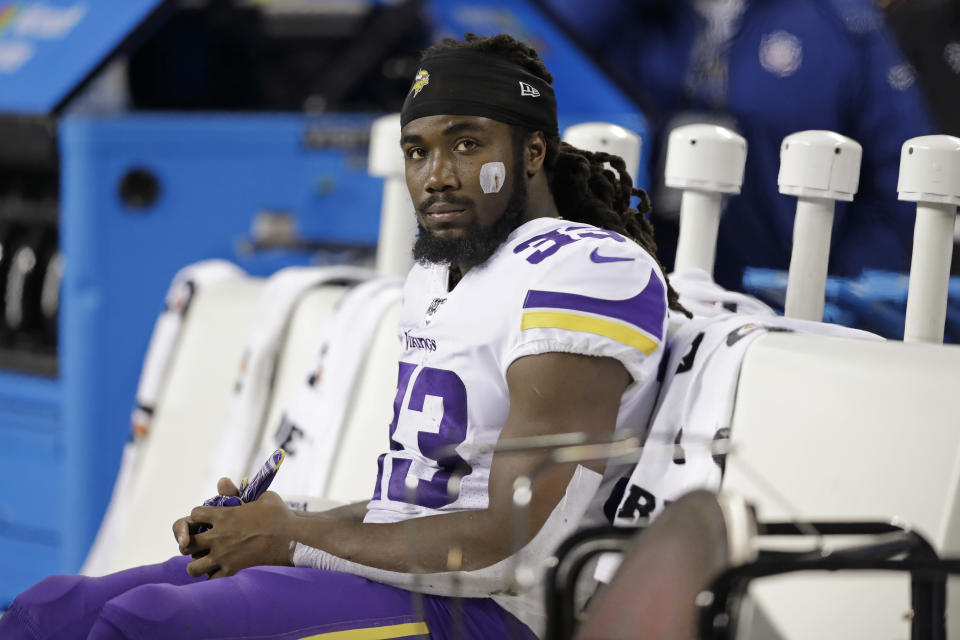Dalvin Cook could be this year's Melvin Gordon, but what can running backs do to help their plight?
At a point in time, running backs were considered essential to NFL teams. Emmitt Smith could confidently hold out, knowing the Dallas Cowboys would need him.
Dalvin Cook is a very good running back for the Minnesota Vikings. In another era, his holdout threat would be a reason for the Vikings to panic. These days, the chances of Cook getting what he wants appear slim.
Melvin Gordon tried last year. He told the Los Angeles Chargers he’d hold out if he didn’t get a new deal. He held out into the season, and the Chargers never budged. Austin Ekeler ended up playing well in his absence and got a nice extension. Gordon never got the deal he sought. His holdout didn’t result in anything.
This isn’t going to get better for running backs. So what can be done?
Dalvin Cook says he won’t play without a new deal
Cook’s holdout threat, heading into the final year of his rookie deal, was absolute.
“He’s out,” a source told ESPN’s Adam Schefter. “Without a reasonable extension, he will not be showing up for camp or beyond.”
Players should use whatever leverage they have. NFL teams have no problem cutting players and saving their non-guaranteed salaries. Maybe Cook will have success.
But it doesn’t seem like Cook has that kind of leverage. The Vikings can just plug in Alexander Mattison at running back. Mattison isn’t as good as Cook, who put up 1,654 total yards and 13 touchdowns last season, but he won’t cost a ton of money at a position in which the return on investment is terrible.
The Christian McCaffrey extension from the Carolina Panthers brought forth another round of debates about whether teams should pay running backs. The recent history of big deals for running backs is even worse than you think. Teams end up regretting those contracts even for running backs who put up special seasons, like Todd Gurley or David Johnson. Maybe you think Cook is special and worth the money, but nobody in the moment thinks that big extension for a star running back will turn out bad. Most of those deals end up looking foolish.
So Cook is stuck. Like Gordon was stuck. Cook wouldn’t get an accrued season if he doesn’t report, and wouldn’t be closer to unrestricted free agency. Cook’s only obvious option is to report, play for his $1.33 million salary and hope to not get hurt. And even if he doesn’t get hurt and has a good season, that’s just the start of the challenge.

Cook could be part of deep 2021 RB free-agent class
When Gordon made it clear he would hold out, reports said he wanted about $13 million a season. The Chargers just waited him out. Gordon eventually reported, had a decent season and got a two-year, $16 million deal with the Denver Broncos. That’s good, but far from what he wanted.
Cook, a second-round draft pick, got a four-year, $6.35 million deal. That’s good money for most people, but most running backs don’t even play into their 30s before their careers are done. A player of Cook’s ability is worth more than what he’s getting paid, but he might not have a path to getting what he’s worth before he has put four years of hard running back mileage on his body. It’s a problem all but a few running backs (like McCaffrey) face.
Running backs are affected more than any other position by rookie deals. When the NFL wanted to implement a scale for rookie deals to get rid of huge contracts for high picks who had never played a pro game, they made a four-year deal standard. First-round picks have a team-controlled fifth-year option. Most running backs won’t have a prime that lasts beyond four or five years.
Even if Cook maintains all of his value before hitting free agency — and the Vikings don’t use the franchise tag on him, like the Tennessee Titans did with 2019 rushing champ Derrick Henry — just look at the potential running back market in 2021:
RBs with one year left on their contract:
*Dalvin Cook
*Aaron Jones
*Derrick Henry
*Leonard Fournette
*Joe Mixon
*Alvin Kamara
*Kenyan Drake
*Todd Gurley
*James Conner
*Damien Williams
*Kareem Hunt
*Tarik Cohen
*Marlon Mack
*Chris Carson
*Jamaal Williams
*Matt Breida— NFL Update (@MySportsUpdate) June 8, 2020
Some have wondered if running backs should be treated differently than everyone else, with a separate salary cap for running backs and quarterbacks. It would take a fundamental change to help the trend of running backs being used up on their rookie deal and tossed aside without a big extension. Unfortunately, with the current structure, it’s smart business for NFL teams to keep cycling through running backs instead of giving any a big long-term deal, no matter how special any back seems in the moment.
Le’Veon Bell never got his long-term deal with the Pittsburgh Steelers, though the New York Jets ended up paying him (and he hadn’t even played a game before there were reports of buyer’s remorse from the Jets). Gordon never seemed close to getting paid by the Chargers. Now, Cook will try with the Vikings.
Maybe they’ll pay him, or he’ll play well again and cash in big next offseason. But it seems more likely that his stance will end up like Gordon’s did, and it’ll be another step back for running backs in what appears to be an unwinnable battle.
More from Yahoo Sports:
